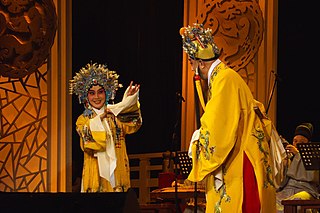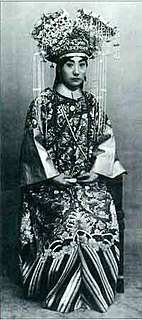
Nanjing, alternately romanized as Nanking, is the capital of Jiangsu province of the People's Republic of China, a sub-provincial city, a megacity and the second largest city in the East China region. With 11 districts, Nanjing, which is located in southwestern Jiangsu, has an administrative area of 6,600 km2 (2,500 sq mi) and a total population of 9,314,685 as of 2020.

Traditional Chinese opera, or Xiqu, is a form of musical theatre in China with roots going back to the early periods in China. It is an amalgamation of various art forms that existed in ancient China, and evolved gradually over more than a thousand years, reaching its mature form in the 13th century, during the Song dynasty (960–1279). Early forms of Chinese theater are simple, but over time they incorporated various art forms, such as music, song and dance, martial arts, acrobatics, costume and make-up art, as well as literary art forms to become traditional Chinese opera.

Kunqu, also known as Kunju (崑劇), K'un-ch'ü, Kun opera or Kunqu Opera, is one of the oldest extant forms of Chinese opera. It evolved from the local melody of Kunshan and later came to dominate Chinese theater from the 16th to the 18th centuries. The style originated in the Wu cultural area. It has been listed as one of the Masterpieces of the Oral and Intangible Heritage of Humanity by UNESCO since 2001. American arts magazine TeRra Magazine acclaimed Kunqu one of the most elegant entertainment performing arts.

Nanjing Normal University is a public research university in Nanjing, China. Founded in 1902 as Sanjiang Normal School, it is one of the oldest and most prestigious higher normal schools in China, and has become a research-intensive comprehensive university co-funded by the Ministry of Education of China and Jiangsu Provincial Government since its separation from Nanjing University in 1952. NNU is a leading National Key University designated by China's former Project 211, Plan 111, and Double First Class University Plan.

Qidong is a county-level city under the administration of the prefecture-level city of Nantong in southeastern Jiangsu province, China. It is located on the north side of the Yangtze River opposite Shanghai and forms a peninsula jutting out into the East China Sea. It has a population of 1.12 million.

The Peony Pavilion, also named The Return of Soul at the Peony Pavilion, is a romantic tragicomedy play written by dramatist Tang Xianzu in 1598. The plot was drawn from the short story Du Liniang Revives For Love, and depicts a love story between Du Liniang and Liu Mengmei that overcomes all difficulties. Tang's play diverges from the short story in that it integrates elements of the Ming Dynasty, despite being set in the Southern Song.

Nanjing Tech University, colloquially known as Nan Gong, is a university located in Nanjing, Jiangsu Province, China. It is located 300 km from Shanghai. NJTech was part of the first group of universities approved by the Chinese Ministry of Education for the training of “Excellent Engineers.” The university specializes in engineering. English language courses are compulsory.

The Russian Institute of Theatre Arts – GITIS is the largest and oldest independent theatrical arts school in Russia. Located in Moscow, the school was founded on 22 September 1878 as the Shostakovsky Music School. It became the School of Music and Drama of the Moscow Philharmonic Society in 1883, was elevated to the status of a conservatory in 1886, was renamed the Institute of Music and Drama in 1918, and was known as the Lunacharsky State Institute for Theatre Arts (GITIS) from 1934 to 1991.

The Nanjing Military Region was one of the former seven military command regions for the Chinese People's Liberation Army. Its jurisdiction covers all military and armed police located in Anhui, Jiangsu, Zhejiang, Jiangxi, Fujian, and Shanghai. It also covers Taiwan, which is claimed by the People's Republic of China but administered by the Republic of China. The head of the region was Cai Yingting. This region is now part of the Eastern Theater Command.

Nanjing Audit University is an accounting-focused university.

The National Theater and National Concert Hall are twin performing arts venues at Liberty Square in Zhongzheng District, Taipei, Taiwan. Completed in 1987, the landmarks stand on the south and north sides of the square with Chiang Kai-shek Memorial Hall to the east. Together the venues are referred to by the abbreviation NTCH. The square itself sits near Ketagalan Boulevard, site of the Presidential Office Building, the National Central Library, the National Taiwan Museum, and the 228 Peace Memorial Park.
The Hillman Center for Performing Arts is a multi-stage performing arts venue on the campus of Shady Side Academy's Senior School in Fox Chapel, a northern suburb of Pittsburgh, Pennsylvania. Featuring dedicated music and vocal practice spaces, the Richard E. Rauh proscenium theater, and the Peter J. Kountz black box theater, the Hillman Center serves as Shady Side Academy's primary performing arts classroom.
Chicago High School for the Arts (ChiArts) is a public four–year college preparatory visual and performing arts high school located in the Humboldt Park neighborhood in Chicago, Illinois, United States. Operated by the Chicago Public Schools district, The school opened for the 2009–10 school year.

Ghenadie Ciobanu is a composer and politician from the Republic of Moldova, who served as the Minister of Culture of the Republic of Moldova (1997-2001) and served as a deputy in the Parliament of the Republic of Moldova in the Party faction Liberal Democrats from Moldova between 2010 and 2014. He composed symphonies, written works for chamber ensembles (instrumental), choral creations, theater and film music, etc.
The Jiangsu Second Normal University is located in the city of Nanjing, Jiangsu province, China. It was established as a modern university in 1952, and is the only one dedicated to both teacher education and educational science research in Jiangsu province. It has many national and provincial education research programs, to guide the province's education and scientific research work for the educational administrative departments at all levels of government and provide the basis for scientific decision-making.
The Jiangsu Performing Arts Group, or JPAG, is a theater company established in 2001 and based in Nanjing, Jiangsu, China. It is one of the largest performing arts groups in China and has won eighteen Plum Blossom Prizes and twenty-one Wen Hua Awards. It has also been named "National Key Enterprise for Cultural Export" six times. The group participates in the Chinese Cultural System Reformation.

The Palace of Eternal Life, also translated as The Palace of Eternal Youth, is a play written by Hong Sheng in the Qing dynasty. He absorbed certain material from the long narrative poem The Song of Everlasting Sorrow written by Bai Juyi and the zaju Rain on the Paulownia Tree (梧桐雨) written by Bai Renfu. The Palace of Eternal Life is acclaimed as one of the China's "Four Great Classical Dramas", along with The Peony Pavilion, The Peach Blossom Fan and Romance of the Western Chamber. The performance is focused on the everlasting love story of Emperor Xuanzong of Tang and his favorite consort Yang Guifei.
Gu Xin is a former Chinese business executive and singer. Gu was the Board Chairman and Executive Manager of the China Oriental Performing Arts Group, a state-owned arts group. On July 9, 2015, the Central Commission for Discipline Inspection (CCDI) issued a notice that it was investigating Gu for "serious violations of laws and regulations".

Wang Yaoqing was a Chinese actor and singer noted for playing the role of a virtuous adult woman, or qingyi, the most important role in Peking opera. He was from Qingjiangpu District, Huai'an in eastern Jiangsu Province.